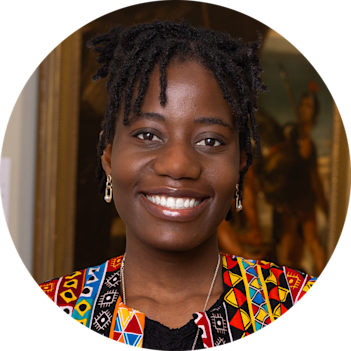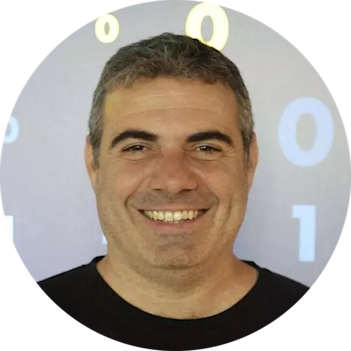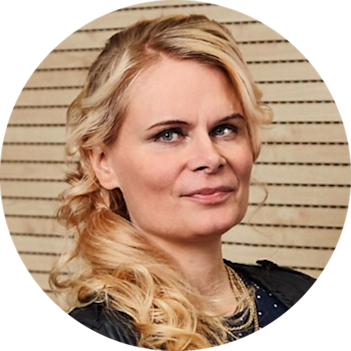Teaching about AI and data science
In 2025, we are looking at research in schools to identify what students should learn about AI, machine learning, and data science, and the best ways to teach these critical topics. Watch recordings, read our summary blogs, and download speakers' slides.
See upcoming seminars in series
Teaching about neural networks in junior high schools in Ghana (27 January 2026)

Speaker: Salomey Afua Addo (University of Cambridge)
In this talk, Salomey Afua Addo took us through her three-year PhD study exploring how to teach about AI in junior high schools in Ghana (learners aged 13–16). First, she laid the foundation by describing the Ghanaian education system through the lens of her case study. Then, she shared how she created a role play and a board game to learn about the feedforward, evaluation, and backpropagation stages of training a single-layer neural network, using simple synthetic data based on a farming scenario.
In addition, Salomey explored how storytelling can be a useful and engaging tool for teaching about AI ethics in a relatable way for young learners. She also explored the perspectives and real classroom experiences of teachers as they use unplugged tools in their AI lessons, as well as the elements of teachers’ pedagogical content knowledge (PCK) required for teaching neural networks.
Salomey Afua Addo is a third-year PhD student at the Raspberry Pi Computing Education Research Centre at the University of Cambridge. Her research focuses on exploring effective approaches for teaching AI concepts in junior high schools in Ghana. She employs a range of methodologies, including case study research, design-based research, thematic analysis, and general quantitative techniques. Her work engages with key themes in curriculum studies, teacher self-efficacy, and teachers’ pedagogical content knowledge, contributing to the growing field of research on AI education in the African context.
Seminar materials
How to measure AI literacy (2 December 2025)

Speaker: Jesús Moreno-León (University of Seville)
In this seminar, Jesús Moreno-León explored methods for measuring and evaluating artificial intelligence literacy. He presented an assessment instrument that has been successfully implemented in several research studies, involving thousands of primary and secondary education students across Spain, discussing both its strengths and limitations.
Additionally, he shared recent progress in developing a new instrument influenced by the SEAME framework, which groups learning objectives and resources related to teaching AI and machine learning based on whether they focus on Social and Ethical aspects (SE), Applications (A), Models (M), or Engines (E — how AI works).
Jesús Moreno-León is a computer science researcher and professor at the University of Seville. His career spans diverse educational landscapes, including leadership roles at the Spanish Ministry of Education and pedagogic management of Fundación Telefónica's 42 Campus network across Spain. He is also co-director of Programamos, a non-profit organisation fostering computer science education from early ages that has won multiple awards.
Seminar materials
Free online course on AI and education: https://programamos.es/ia/ Although the course itself is in Spanish, many of the resources are in English.
Using the micro:bit to learn about machine learning practices (11 November 2025)

Speaker: Karl-Emil Bilstrup (Copenhagen University)
This seminar presented the research and design rationales behind ml-machine.org, the precursor to micro:bit’s CreateAI. This educational tool lets students build machine learning models with accelerometer data from the micro:bit.
Karl-Emil Bilstrup showed prototypes of tangible interfaces and embodied activities that enable secondary-level students to explore data processes and machine learning practices. He discussed how these tools can support critical reflections on the ethical design considerations and trade-offs involved in creating data-driven systems and how they can unbox aspects of modern chatbots. Further, he described his collaborations with teachers, schools, and other educational organisations, such as the Danish Broadcasting Corporation and the Micro:bit Educational Foundation, to integrate his tools into educational and organisational practices.
Karl-Emil Bilstrup is a postdoctoral computer science researcher and interaction designer at Copenhagen University. He is part of the Center for Computational Thinking and Design at Aarhus University, Denmark, where he did his PhD on designing educational tools for teaching machine learning in secondary education with a Scandinavian focus on sustaining students’ agency in an increasingly digitised and computationalised world. He has contributed to research in embodied interaction for learning and has been a visiting researcher in the Embodied Design Research Laboratory at UC Berkeley. He has collaborated with the Micro:bit Educational Foundation about designing CreateAI, which brings embodied activities with machine learning into classrooms.
Seminar materials
Data-related concepts and practices for AI education in K–12 (14 October 2025)

Speaker: Viktoriya Olari (Free University of Berlin)
Curricula around the world have started to include content related to AI into their agendas. This process is timely and important, but it is also challenging because the elaboration of the AI field for K–12 is still ongoing. Current efforts often underappreciate the critical role of data, despite it being a fundamental component of AI systems. If the goal is to enable students to understand how AI systems work and what their implications are, it is crucial to understand what data underpins these systems, and how it is collected and processed.
To advance knowledge about the role of data in AI education, Viktoriya Olari conducted a comprehensive theoretical analysis of the AI field. In this seminar, she presented the results of her work: a model of key data-related practices and a collection of key data-related concepts that are essential for understanding how AI systems are created and function. She also shared insights from a design-based research study on implementing data-related concepts and practices in AI education in schools.
Viktoriya Olari is a researcher and PhD student in the Computing Education Research Group at the Free University of Berlin, with research interests in AI and data education. She has worked on various projects educating teachers and students on AI and data literacy, such as TrainDL. She served as a member of the AI literacy expert group at the Council of Europe and is currently an advisory board member of the Data Civic Lab in Germany.
Somekone - Teaching about AI with an explainable social media simulator (9 September 2025)

Speakers: Henriikka Vartiainen and Matti Tedre (University of Eastern Finland)
To support AI literacy and media literacy education initiatives on the mechanisms of social media, the Generation AI project has developed an explainable AI (XAI)-based social media simulator, "Somekone". Somekone was designed to help learners understand the fundamental processes behind social media platforms, focusing on four AI- and data-driven core concepts: data collection, user profiling, engagement metrics, and recommendation algorithms. The simulator also illustrates the concept of similarity, how filter bubbles form, and how polarisation happens on social media.
This talk describes the educational theory, pedagogical strategies, and classroom resources developed to support teachers and invites participants to experiment on the tool the same way it is used in classroom environments.
Henriikka Vartiainen is a university lecturer and senior researcher with the University of Eastern Finland, School of Applied Educational Science and Teacher Education. Her research interests in AI education include data agency, co-design, design-oriented pedagogy, and the role of AI in art, craft, and design. Vartiainen received her Ph.D. in education from the University of Eastern Finland and the title of Docent in Education from the University of Jyväskylä, Finland.
Matti Tedre is a professor of computer science at the School of Computing, University of Eastern Finland. His research interests include AI education, computing education research, and the history and philosophy of computer science. Tedre received his Ph.D. from the University of Joensuu. He is an Extraordinary Professor at North-West University, and holds the title of Docent at Stockholm University and the University of Eastern Finland.
Seminar materials
Somekone: Somekone is an Instagram-like interface and monitoring tool for explaining the data-driven processes used by social media platforms. It make these complex ideas accessible and engaging for young learners aged 10 and above. The tool provides hands-on experiments and real-time visualisations, illustrating how user actions influence both their personal experience on the platform and the experience of others. The tool allows students generate their own data, analyse it, and establish a line-of-sight from their recommendation results to their own actions.
This fosters a deep, hands-on foundation for further learning of how targeted advertisement, recommendation systems, and opinion swaying all rely on simple, data-driven mechanisms. The learning interventions designed for the tool promote collaborative learning, allowing a whole classroom of students to work simultaneously from their individual mobile devices. Research on the tool has shown it is well suited to teaching the fundamental social media mechanisms above.
Try the platform at: somekone.gen-ai.fi
Code at Nick Pope's GitHub: github.com/knicos
Demystifying AI in the math classroom: Exploring machine learning concepts with high-school students (8 July 2025)

Speakers: Sarah Schönbrodt (Salzburg University), Stephan Kindler and Martin Frank (Karlsruhe Institute of Technology)
Artificial intelligence (AI) and machine learning (ML) rely on mathematical modeling. Interestingly, many of the core mathematical techniques underpinning ML are quite straightforward and accessible with high-school level mathematics. This observation suggests that AI education should not be limited to computer science courses, but should also be meaningfully integrated into mathematics curricula.
In our talk, we explored various strategies for simplifying and teaching key mathematical ideas behind support vector machines and artificial neural networks. These methods are deeply rooted in mathematical concepts from linear algebra and calculus — mathematical areas that students often find abstract or unengaging. By addressing data-driven problems from AI within the context of mathematics education, we have a unique opportunity to make mathematical concepts more relevant and exciting for students, while also fostering a deeper understanding of AI, including its risks and potential. We outlined intended learning pathways and digital learning material for high-school students and critically examined which underlying mathematical concepts can be explored in the classroom (‘white-box’ approaches), and which may need to be treated as ‘black-box’ due to their inherent complexity.
Sarah Schönbrodt is an assistant professor of mathematics education at Salzburg University. She is the founder and CEO of the non-profit organisation KI macht Schule Austria. In her research, she focuses on learning about modern applications of mathematics in school teaching, with an emphasis on applications from the field of AI (www.schoenbrodt.info/en). She also manages the Computational and Mathematical Modeling Program (CAMMP) in Salzburg, which gives high-school students insight into the relevance of modern mathematics.
Stephan Kindler is a PhD student at the Karlsruhe Institute of Technology (KIT). After completing his studies in mathematics and chemistry as well as a teaching traineeship, he began working as a teacher and started his PhD under Professor Martin Frank. His research focuses on the didactic aspects of artificial neural networks and the development of teaching and learning materials on this topic. He is also involved in the Computational and Mathematical Modelling Programme (CAMMP) in Karlsruhe.
Martin Frank is a professor for Computational Science & Mathematical Methods at the Karlsruhe Institute of Technology (KIT) and director of the Scientific Computing Center. After a junior professorship at TU Kaiserslautern, he was Professor of Mathematics at RWTH Aachen University (2009-2017). There, he founded the Computational and Mathematical Modeling Program (CAMMP) education lab. Since 2017, he has been a professor at KIT, where he is an active researcher in both mathematical methods (including AI) and mathematics education.
Seminar materials
Further reading:
Decision trees (Biehler & Fleischer, 2021)
Support Vector Machine (Schönbrodt & Frank, 2025)
Artificial Neural Networks (Kindler et al., 2024)
Linear regression (Biehler et al., 2024)
N-Gram model (Hofmann & Frank, 2022)
Fostering transformative agency of children in the age of AI (17 June 2025)

Speaker: Netta Iivari (University of Oulu)
The seminar introduced transformative agency and its importance for children’s computing education. It offered examples of ways to foster children’s transformative agency within their computing education, specifically focusing on how to address AI and to invite children to critically analyse and design their future with AI in it.
Netta Iivari is a Professor in Information Systems and research unit leader of the INTERACT research unit at the University of Oulu. Her long-lasting research interest concerns understanding and strengthening children’s participation in shaping and making their digital futures. She has explored participatory design, critical design, empowerment, inclusion, ethics, values and criticality in collaboration with children, working in the context of their computing education. Recently, she has focused on emerging technologies such as artificial intelligence, engaging children in critical analysis and design of AI futures.
AI as a design domain: Empowering students with no-code AI/ML app development in the classroom (13 May 2025)

Speakers: Henriikka Vartiainen and Matti Tedre (University of Eastern Finland)
In the landscape of AI education, it is important to provide students with the tools and understanding to actively participate in AI-driven environments. This talk introduced ‘GenAI Teachable Machine’, an educational platform designed for students aged 10–16 to explore core AI concepts through making practical, hands-on applications. The talk described the educational theory, pedagogical strategies, and classroom resources developed to support teachers.
GenAI Teachable Machine is a no-code app development studio that empowers young learners who have little to no programming experience to create their own AI/ML-powered applications for mobile phones and computers. It simplifies complex machine learning (ML) processes into a user-friendly, accessible interface familiar from Google Teachable Machine. Students can independently design and build apps using their own creative ideas, designs, and data sets.
Henriikka Vartiainen is a lecturer and senior researcher at the University of Eastern Finland, School of Applied Educational Science and Teacher Education. Her research interests in AI education include data agency, co-design, design-oriented pedagogy, and the role of AI in art, craft, and design. Henriikka received her PhD in education from the University of Eastern Finland and the title of Docent in Education from University of Jyväskylä, Finland.
Matti Tedre is a professor of computer science at the School of Computing, University of Eastern Finland. His research interests include AI education, computing education research, and the history and philosophy of computer science. Tedre received a PhD from the University of Joensuu. He is an extraordinary professor at North-West University, and holds the title of docent at Stockholm University and University of Eastern Finland.
Seminar materials
GenAI Teachable Machine: Using the GenAI Teachable Machine studio, children train ML models with their chosen data, define app actions, and deploy fully functional standalone mobile apps. This fosters a deep, hands-on understanding of supervised learning and ML workflows. The studio emphasises inclusivity and accessibility with its no-code approach. It offers instant app previews for iterative testing and an eXplainable AI (XAI) feature for easier debugging. It promotes collaborative learning, allowing multiple students to co-create and contribute training data simultaneously from their individual mobile devices. It creates a line-of-sight from their ML-driven apps to their own data sets. Research on the tool has shown it is well suited to teaching what bias is and how it forms in ML systems. Try the app development studio at tm.gen-ai.fi
Code for GenAI Teachable Machine at Nick Pope's GitHub: https://github.com/knicos/genai-tm
Pedagogical designs: https://doi.org/10.15388/infedu.2024.15
Technology description: https://doi.org/10.1109/TLT.2025.3529994
Situating high school data science in the lives of students (8 April 2025)

Speakers: David Weintrop, Rotem Israel-Fishelson and Peter F. Moon (University of Maryland)
This seminar introduced ‘API Can Code’, an interest-driven data science curriculum for high-school students. It focused on strategies for integrating data science learning within students’ lived experiences and fostering authentic engagement. Drawing on insights from classroom implementations, the speakers explored methods for designing contextually relevant and meaningful educational experiences in data science.
Dr David Weintrop is an Associate Professor and the Dean's Impact Professor in the Department of Teaching & Learning, Policy & Leadership in the College of Education with a joint appointment in the College of Information at the University of Maryland (UMD). His research focuses on the design, implementation, and evaluation of effective, engaging, and equitable computational learning experiences. His work lies at the intersection of design, computer science education, and the learning sciences. David holds a PhD in the Learning Sciences from Northwestern University and a B.S. in Computer Science from the University of Michigan.
Dr Rotem Israel-Fishelson is a postdoctoral researcher in the Department of Teaching & Learning, Policy & Leadership in the College of Education at the University of Maryland. Her research focuses on exploring ways to introduce learners to data science using engaging computational learning experiences. She is also interested in assessing computational thinking and creativity skills in game-based learning environments using learning analytics methods. Rotem holds a PhD in Science Education from Tel Aviv University, an M.Sc. in Media Technology from Linnaeus University, and a B.A. in Instructional Design from the Holon Institute of Technology.
Dr Peter F. Moon is a postdoctoral researcher at the University of Maryland. He graduated from UMD's PhD program in Mathematics Education in 2024. He has taught math, statistics, and computer science at Archbishop Curley High School in Baltimore while coaching swimming and he has taught courses in statistics for undergraduate middle grades pre-service teachers at UMD.
Developing data awareness: Understanding and navigating the data-driven world (11 March 2025)

Speakers: Lukas Höper and Carsten Schulte (Paderborn University)
In our increasingly AI-powered world, there’s no question that we should teach students about data-driven technologies to empower them to understand these everyday technologies and to help them make informed and self-determined decisions about their everyday interactions with such technologies. However, the question remains as to what exactly students should learn and how we can support them in connecting the concepts they learn in class to their everyday lives.
In this seminar, Lukas Höper and Carsten Schulte will present the Data Awareness Framework. This explanatory model of data-driven technologies and designed interventions for middle school students is a way for students to explore the role of data in such technologies and apply it to applications they use daily.
Lukas and Carsten will introduce the framework, show how it can be implemented in middle schools, and briefly summarise interesting findings from their research on fostering students’ data awareness.
Lukas Höper is a PhD student in Computing Education Research at Paderborn University, Germany. His main research interest is empirical research on teaching and learning processes in K–12 computing education. In his dissertation, he develops and evaluates the data awareness framework. Since 2020, he has been working on data awareness and other topics related to AI and data science education in schools in the ProDaBi project.
Dr Carsten Schulte is a Professor for Computing Education Research at Paderborn University, Germany. His work and research interests are the philosophy of computing education, artificial intelligence in education, and empirical research on teaching and learning processes (including eye movement research). Since 2017, he has been working together with Didactics of Mathematics (Paderborn University) on the ProDaBi project, in which data science and artificial intelligence are prepared as teaching topics. He is also a part of the collaborative research centre ‘Constructing Explainability’ on explainable AI.
AI in K–12 education: Empowering teachers through professional development and evidence-based theories from classroom implementation (11 February 2025)

Speaker: Franz Jetzinger (Technical University of Munich)
It's true — AI is everywhere! Consequently, AI-related competencies are gradually being integrated into computer science (CS) curricula across the globe. However, this raises two challenges: first, teachers are not adequately prepared for this topic, which requires both AI and pedagogical knowledge. Second, evidence-based theories on teaching and learning about AI in K–12 education are still lacking. Franz Jetzinger addressed both issues in this talk.
In the first part, Franz presented the implementation and evaluation of a scalable professional development (PD) programme that addresses relevant challenges such as limited resources, a large number of teachers to be trained, and the considerable heterogeneity of teachers’ backgrounds.
In the second part, he shared findings from an action research project investigating how teachers implement the topic in their classrooms and the difficulties teachers and students face, to provide a foundation for evidence-based advancements of teaching AI.
Franz Jetzinger is a passionate high school teacher of computer science, physics, and music. He has authored several German CS textbooks, and conducted numerous workshops for teachers. Since 2021, he has been a member of the Computing Education Research Group at the Technical University of Munich and is actively working on improving computing education in the classroom. To this end, he designs professional development programmes to prepare CS teachers for effectively teaching about AI. His research focuses on evaluating these PD programmes and investigating the implementation of AI-related competencies in the CS classroom.
Teaching with and about AI in K–12 education: A clear-eyed approach to navigating the road ahead (21 January 2025)

Speaker: Shuchi Grover (Looking Glass Ventures)
AI has a dual role in K–12 education: it can be used as a teaching tool (teaching with AI) and it necessitates the promotion of AI literacy (teaching about AI).
Through these two themes, Shuchi Grover will look at how generative AI can be used in STEM and computer science (CS) classrooms to ethically support teaching and learning. She will also explore how foundational AI literacy and AI concepts can be integrated into CS curricula, to develop students' understanding of AI and machine learning as well as AI ethics.
Through concrete examples and recently developed frameworks, this seminar aims to equip educators with practical insights to understand AI's impact on society and its role in the future of education.
Dr Shuchi Grover is the Director of AI and Education Research at Looking Glass Ventures in Austin, Texas. She is a computer scientist and learning scientist with over 20 years’ experience in PK–12 computing education in formal and informal settings. She has led several National Science Foundation-funded projects involving research & design of curriculum, assessments, tools, and environments that help develop 21st-century competencies in computing, data science, AI, and cybersecurity, as well as the integration of STEM, computer science, and data science.